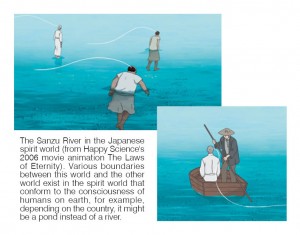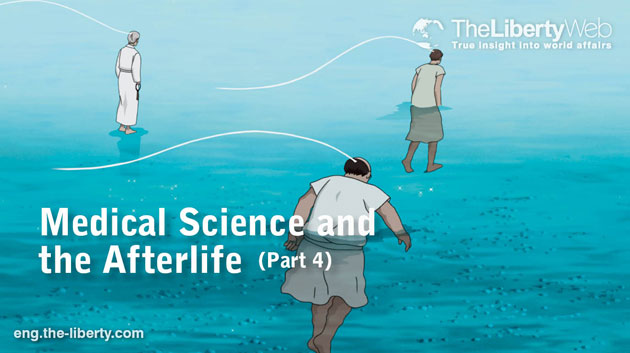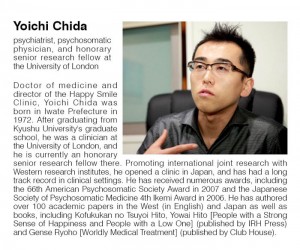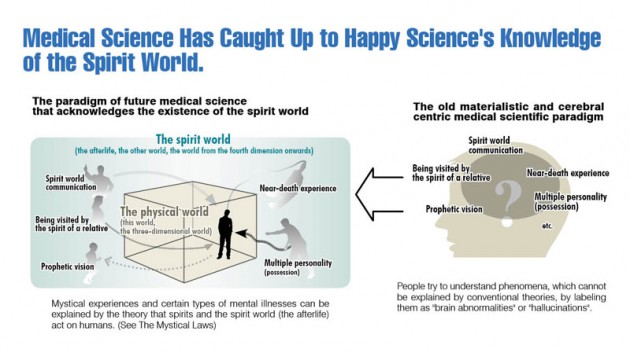Medical Science and the Afterlife (Part 4)
Clinically Utilizing the Idea of Reincarnation in Psychosomatic Medicine
Compared to the West, the amount of prescriptions for antianxiety agents and sleeping pills in Japanese psychiatry and psychosomatic medicine is often striking. Those patients, who have been prescribed such medication for a long-term, become dependent on them; with patients suffering withdrawals when they reduce the amount they take and stopping altogether turns into a problem. One newspaper claims, “Behind the overemphasis on medication in psychiatry in Japan is a lack of ability on the part of psychiatrists to listen to the complaints of their patients and make diagnoses.” (Note 4)
Amid this background, clinically achieving results based on a spiritual view of life and not relying too much on medicine is Dr. Yoichi Chida, who runs a psychiatry and psychosomatic medical clinic in Kawasaki City. As an honorary senior research fellow at the University of London, he is promoting international joint research between Western institutes and “positive psychology”, and is only one of a handful of Japanese researchers that presents at APS (the American Psychosomatic Society), where researchers from all over the world gather (see interview below).
“There are many presentations at APS based on spiritualism, such as Christian-based psychotherapy and Buddhist meditation, and they are now referred to as ‘body, mind, and spirit’ talks. However, Japan currently remains stuck between ‘body and mind’. It is inadequate not to include the spirit, and we are not keeping abreast with global trends,” he says.
What Dr. Chida places at the core of his diagnosis and treatment is “a spiritual view of life”, which is one where humans reincarnate in this world and the other world and build up spirit training. Below is one of his clinical cases (Note 5).
Note 4: Yomiuri Shimbun, November 13.
Note 5: See the prologue of Gense Ryoho [Worldly Medical Treatment], published by Club House.
A Message From a Son’s Spirit
43-year-old Ms. A was going to Dr. Chida’s clinic regularly for over a year with a panic disorder. Her 19-year-old son had suffered from depression, but the treatment he received at another hospital was ineffective, and he committed suicide.
“I was brushing my teeth in the laundry one night when I sensed that my son was talking to me. So I instinctively glanced sideways and for an instant I saw him standing there. Then the cup on the sink shook for about a minute, and it suddenly stopped. It’s a solid sink that doesn’t budge even if you try to shake it. What does this mean?” she asked when she went to Dr. Chida’s clinic two months later.
Dr. Chida said that the shaking cup was a “rap phenomenon”, which has been studied in spiritualism since the 19th century, and that it was probably a sign that her son’s spirit was lost and was seeking help from Ms. A. He also advised that it was important that Ms. A studied spiritual views on the eternal lives of humans and reincarnation, interpret her son’s life from that perspective, and tell her son’s spirit what she thinks. After doing this for a month, Ms. A returned to the clinic.
 “My son appeared in my dream the other day. There was a bridge over a river, and we crossed it. Just before we reached the other side, my son told me that he would continue on alone and that he wanted me to go back,” she reported.
“My son appeared in my dream the other day. There was a bridge over a river, and we crossed it. Just before we reached the other side, my son told me that he would continue on alone and that he wanted me to go back,” she reported.
Dr. Chida said that was a so-called “prophetic vision”, and the river was the spirit world’s Sanzu River, or River of Three Crossings, that Japanese often see when they have near-death experiences. He told her that her son crossing the bridge meant that he had finished reflecting, and he would safely depart this world.
“After that dream, my very stiff shoulders suddenly loosened up,” she said. “I’m going to help people as a home helper, and I’ll enjoy life so that my son in the other world can serve as a good example.”
“It was almost as if Ms. A was a different person because her expression was so bright, and I felt that the evil spirit had really been removed,” says Dr. Chida. There are many cases that can be resolved through spirituality even though they can’t be explained by materialism or cerebral centrism. For the sake of their patients, Japanese psychiatry and psychosomatic medicine need to break away from their materialistic bias.
Interview
The materialistic Japanese medical treatments just don’t know about or want to acknowledge spirituality.
Your Perspective Changes When You Know About Reincarnation.
Q: What kind of spiritual talks do you mainly have at your clinic?
It varies, but generally people who have a psychiatric or psychosomatic check-up often don’t have peace in their familial relationships. Their parents may have abused them when they were children.
Now, a materialistic way of thinking doesn’t explain why they were born to such parents. I think that about all they can do is think existentially, questioning why it was only them who were thrown into this horrible environment.
In that situation, we tell them about the idea of reincarnation. We have them understand that it is an environment that they chose to be born into and a family relationship that they mutually promised to be born into, which could resolve an unfinished issue from their former lives and improve their spirits.
When we do that, their perspective dramatically changes. Their pent-up resentments turn into gratitude, and they actually accept that they have their roles for the purpose of improving their spirits. When patients’ minds and values change like this, their relationships with their parents up until that point often magically change in an instant. The communication between them and their parents that had been broken off for years resumes again.
People Who Don’t Believe Simply Don’t Know.
Q: Are there many patients that accept that a spiritual view of life?
Yes. People, who even seem to be very materialistic, are sometimes satisfied when you naturally explain to them that former life therapy and near-death experiences have been scientifically studied and proven globally, and you cite evidence and figures to support it. I think that people who don’t believe such things simply don’t know the latest information.
Spiritual truth simply can’t be explained by the current scientific theories, and so when the measuring of brain waves and experimentation advances further, it’ll be rapidly proven. That’s why materialistic people have fixed ideas, and simply don’t want to acknowledge it.
To establish spiritual medical treatment, it is necessary to, in addition to such scientific elements, incorporate epidemiological research as well as clinical experience that the general population will understand and be moved by such as the case of Ms. A (see main text). Because we are often either prejudiced towards science or clinical practice, medical science or medical treatment, it is necessary to provide spiritual medical treatment while linking academic aspects and medical treatment.
Medical Science Has Caught Up to Happy Science’s Knowledge of the Spirit World.
All the reports, experiments, and clinical cases that we have seen above indicate one simple fact. Namely, that spirits and the “other world” (the afterlife), which is the spirit world, exist.
Also, all the information above is consistent with the knowledge of the spirit world that Happy Science’s Master Ryuho Okawa has revealed in many of his more than 1,000 books (Figure). I will cite relevant parts from those books below. For example, this is on near-death experiences.
“The near-death experiences currently happening around the world were actually planned by spirits in the other world. They are doing this to teach us that spirits and the other world exist.” (Note 6)
The brain of the author of Proof of Heaven introduced at the beginning of this book was affected by a type of bacteria that caused such extensive damage to his brain function that he was extremely close to death, but it is incredibly rare for an adult to be afflicted with this bacteria. That the talented neurosurgeon had unusual symptoms and experienced the afterlife at a deep level may mean that spirits planning near-death experiences as medical proof of the other world singled him out.
And about brains there is this.
“As a result of my spirit world research spanning many years, it has become known that ‘even after the body dies, is cremated, and the soul left the earth, humans can have the same ideas that they had when they were alive and can recall every thought.’ Therefore, the working of the mind is not a function of the brain. The function of the brain is merely a path or tool for communicating with the working of the mind more smoothly, accurately, and quickly (Note 7).
It is explicable if you understand that the brain behaves as if it’s connected to another dimensional space, and that the brain is a path for transmitting to the body the workings of the “mind”, which spiritual being affects.
Note 6: From chapter 8 of Progress Thinking (written by Ryuho Okawa and published by IRH Press)
Note 7: From the introduction of The Imperishable Laws (Ibid.)
Saving Patients in a Real Sense
Master Okawa’s latest book, Fujobutsu no Genri [The Principle of Not Resting in Peace], points out in chapter 1 the limitations of materialistic medical sciences, “Doctors treat our bodies, but they don’t know anything about post death. Treatment itself is usually materialistic.” It explains the inadequacy of psychiatry, which doesn’t acknowledge spirits, as follows.
“When someone sees, hears, or feels spiritual things, they are immediately considered ill and presently said to have schizophrenia. […] However, they may really be seeing spirits and hearing their voices rather than hallucinating or hearing things. Yet, often they are isolated because there is no way of treating their problems, and they are thought of as a nuisance to their families. In such cases, it might not be easy to save the people.” (Ibid.)
Simply because medical science is ignorant about spirits, there are many people who have been assigned an illness, been isolated, and are miserable. This book explains that medical phenomena, such as being visited by the spirits of relatives prior to dying, out-of-body experiences, and dissociative disorders (having no recollection of committing the crime) are related to spirits and the spirit world. I recommend most people, including medical care providers, read this book.
By opening their eyes to the spiritual knowledge revealed by Happy Science, medical science and treatments from now on must break through the limitations of materialistic medical treatments and be able to save patients in a real sense.





















